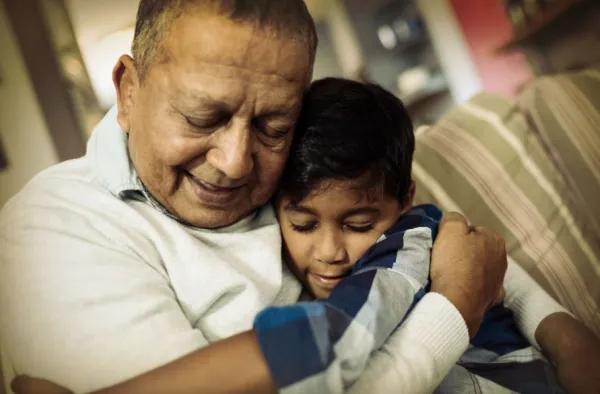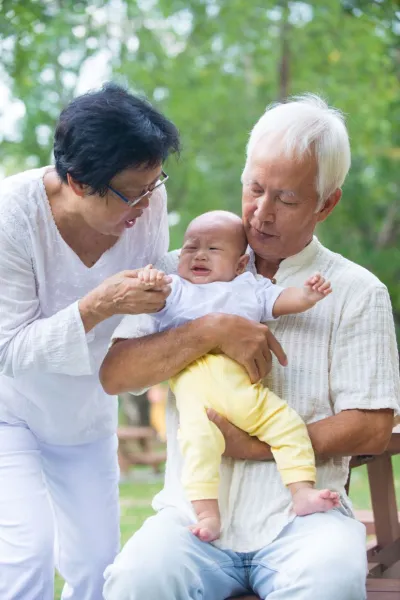Happier and Brighter: How Grandparents Enrich Children's Lives

Much is understood about parenting and its impact on children’s development and well-being, given the large amount of caregiving research in the past decades.
However, not much has been done on grandparents, despite the reality that they are actively involved in looking after children.
Why an article on grandparents? Partly because we live in a rapidly ageing society. Our lifespan has increased significantly, contributing to growing populations of elderly people. So children are more likely to grow up having grandparents around longer than before.
Domestic arrangements may also involve grandparents, especially in families burdened by cost of living. Urban societies are seeing both parents working to make ends meet, leaving their children in the care of grandparents where available.
Some grandparents still financially support their own children who are young parents. It may also be more expensive to leave the family home, so three generations may live in the same household.
It can be useful to know what scientific literature says about the influence of grandparents, especially in their role as secondary caregiver, or even main caregiver. Such information could help us navigate how we foster the upbringing of children as they grow into adults, with grandparents in the picture.
Mixed findings
So what do we know about grandparents with regards to children’s development? Overall, there are mixed findings on the advantage of having grandparents as caregivers.
For the most part, review studies have suggested that involvement of grandparents contribute to better physical development and socio-emotional well-being, with some even pointing to improved educational attainment and better communication skills.
However, global statistics do not favour children being cared for primarily by grandparents. Recent studies found evidence of poorer developmental milestones, emotional well-being and school performance in children whose main caregivers are their grandparents.
Perhaps due to their age and their relationship with their grandchildren, grandparents are often less meticulous and more permissive than parents. Grandparents also often pamper their grandchildren, which may prevent kids from developing necessary skills like resilience and self-confidence.
These findings, therefore, imply that parents are still very significant caregivers for their own children’s development and well-being.
How children’s development benefit from their grandparents depends of various factors. Some factors could be detrimental such as poor health of grandparents, poor quality of connection with grandparents, existing conflicts between parents and grandparents, as well as anything else that adds to family stress.
Supportive role
Nevertheless, when grandparents are healthy, foster strong connection with grandchildren and are in good terms with their own children, they can play a supportive role as secondary caregivers that can benefit children and the family. They come in the forms of additional emotional comfort, as advisors to parents and even as financial resource for both parents and children.
In the temporary absence of parents while they are at work, grandparents can provide a continued sense of belonging and emotional support. Some research have shown that children and teenagers who bond well with grandparents have improved emotional well-being, with lower likelihood of depressive tendencies.
Grandparents can also be good sources of cognitive stimulation for children, as well as support for parents in consistent disciplining. In cases involving children with disabilities, grandparents can provide a very important support as co-parents to provide the much-needed caregiving respite to parents.
Grandparents who bond with children as early as their birth and nurture them as they grow up are more likely to receive care from their grandchildren when they are older. This provides opportunities for children and teenagers to learn about issues of the elderly and be better prepared when they become adult caregivers to their own parents.
Leverage on roles
Either way, grandparents do have impact on children’s development. What is important is for us to leverage on the roles that grandparents play to contribute towards healthier development of children towards resilience and being valuable members of society.
Grandparents can provide support to parents in terms of basic caregiving as well as to encourage adaptive behaviour skills development, cognitive stimulation and emotional regulation in children.
Given the importance of grandparents’ roles in child development and well-being, it would be good for stakeholders of family development such as health care professionals, educators and social workers to consider integrating them as part of any systemic planning.
Efforts to improve ties between grandparents and children could promote mutual well-being where both can benefit from a sense of connectedness and social support.
However, we still need more research on the impact of grandparents in child and family development, especially within the South-East Asian region where such studies are few and far between.
I would like to implore social science researchers to consider including grandparents as a relevant factor in their studies so that we can better grow as a community that is informed by updated evidence.
Professor Alvin Ng Lai Oon
School of Medical and Life Sciences
Email: @email
This article was first published in The Star, 6 Nov 2023.




